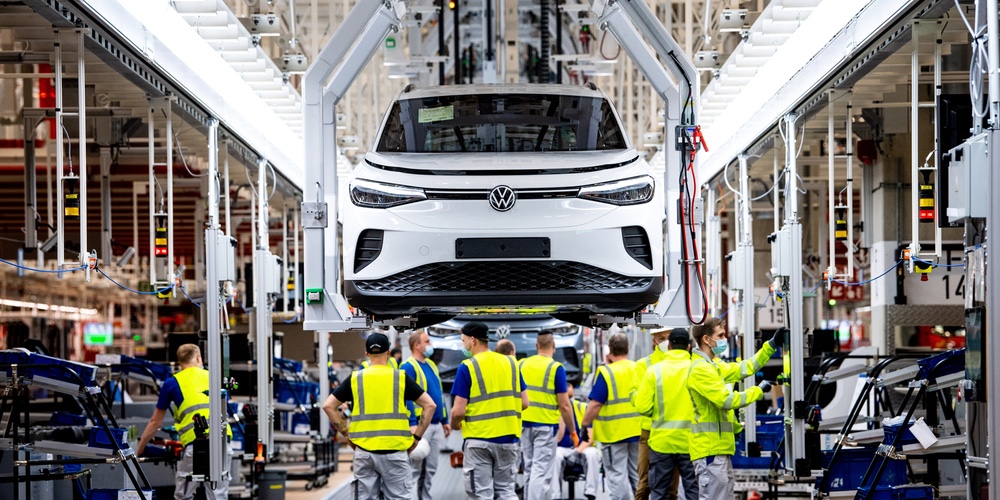The production capacities for a massive increase in electromobility in the European market have already been established, as confirmed by the German Association of the Automotive Industry (VDA) to Mobility Portal Europe.
“This year, it is expected that nearly one in two cars produced in Germany will be an electric vehicle (EV),” a spokesperson asserts.
In this context, the VDA estimates that approximately 873,000 new electrified cars will be registered in the country this year.
“We forecast that fully electric battery-powered cars will increase by approximately 75%, reaching 666,000 units, while plug-in hybrids will rise by 8%, totalling 207,000 units,” they detail.
In contrast, throughout 2024, a total of 572,514 EVs were registered, of which 380,609 were fully electric and 191,905 plug-in hybrids.

How will they achieve their objectives?
According to the VDA, the German automotive industry is committed to the Paris climate goals and is decisively driving the deployment of electromobility.
“Between 2025 and 2029 alone, global investments totalling 320 billion euros are expected in research and development,” they indicate.
They add, “Furthermore, around 220 billion euros will be invested, primarily in adapting production plants.”
A misleading January for electric vehicle registration figures
Data from the Federal Motor Transport Authority (KBA) shows that 34,498 pure EVs were registered in January, representing a 53.5% increase compared to the same month last year.
However, the automotive sector warns that this growth is due to exceptional factors.
“This sharp increase is due to the weakness of the same month last year, following the abrupt termination of the EV purchase subsidy in December 2023,” explains the Association of International Motor Vehicle Manufacturers (VDIK).
In this regard, the Central Association of the German Automobile Trade (ZDK) points out that January’s growth does not reflect real demand.
“To meet the CO2 emissions limits for fleets, which came into effect on January 1st, manufacturers moved registrations of new EVs from last year to this,” they state to Mobility Portal Europe.
As a result, they anticipate that registration figures will decline again in the coming months.
One of the factors significantly affecting the dynamics of the electric vehicle market is the CO2 emissions “CAFE” regulation.
From the ZDK’s perspective, the current regulatory system does not align with market realities.
“While ambitious CO2 reduction targets are necessary, the regulatory framework must take into account regional disparities in purchasing power and charging infrastructure,” they argue.
The regulation imposes penalties on manufacturers who fail to meet the emissions limits for their fleets.
“Throughout the year, this will likely lead to an increase in discounts from manufacturers, who will do everything possible to comply with their fleets’ CO2 limits and avoid costly penalties,” they maintain.
While the EU continues to promote strict measures to reduce emissions, sector associations insist that the success of electromobility will depend on a flexible roadmap that includes more balanced transition measures.
The ZDK urges the European Commission to integrate the entire automotive value chain into the development of the CAFE regulation.
“A comprehensive approach must not only consider manufacturers but also distributors and dealers, who are key players in the adoption of electromobility,” they explain.
Meanwhile, the VDIK calls for an immediate suspension of these penalties until the market is ready to absorb the transformation.
“The sector cannot continue to bear additional burdens during a crisis,” they state.
And they emphasise: “It is necessary to create an environment that builds consumer confidence and allows for sustainable growth.”
For its part, the VDA states that regulatory and structural obstacles persist, requiring urgent action from both industry and the political sphere.
“There is an urgent need to act in response to the various global and commercial challenges, the still insufficient framework conditions, and the current low demand for electric cars,” it highlights.
In this context, it argues that the reviews of the two regulations for passenger cars and commercial vehicles should be brought forward to 2025, and their progress should be assessed periodically at a political level.
“To avoid additional burdens on the industry and not restrict investment opportunities for companies, the European Commission must act swiftly and send a clear signal that it will create the necessary flexibility to meet the objectives,” it concludes.








